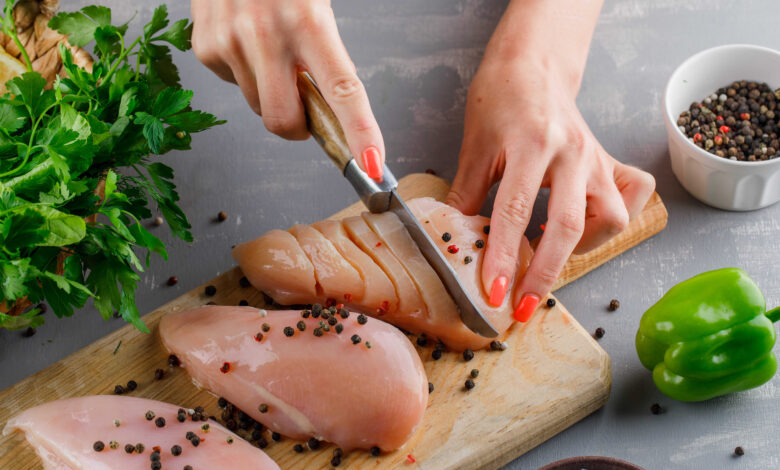How Long Does Chicken Last in the Fridge?

Understanding Food Safety Guidelines
When it comes to food safety, understanding the shelf life of different perishable items is crucial. One such common food item is chicken. Whether it’s raw or cooked, knowing how long chicken can last in the fridge is essential for maintaining food safety and preventing foodborne illnesses. In this article, we will explore the various factors affecting the shelf life of chicken, proper storage techniques, signs of spoiled chicken, and tips for maximizing its shelf life.
Importance of Safe Food Handling
Proper food handling is of utmost importance to ensure food safety. It involves a set of practices and procedures aimed at preventing contamination and maintaining the quality of food. When it comes to chicken, safe food handling begins from the moment you purchase it. Always check the expiration date and choose fresh chicken that has been properly refrigerated at the store.
Foodborne Illnesses and Contamination Risks
Improper handling and storage of chicken can lead to the growth of harmful bacteria, resulting in foodborne illnesses. Salmonella and Campylobacter are two common bacteria associated with raw chicken. These can cause symptoms like nausea, vomiting, abdominal cramps, and diarrhea. Cross-contamination is another risk factor, where the bacteria from raw chicken can spread to other surfaces or foods if not handled correctly.
Shelf Life of Chicken
The shelf life of chicken refers to the period during which it can be safely consumed while maintaining its quality and taste. Several factors influence the shelf life of chicken, including its freshness, storage conditions, and whether it is raw or cooked.
Factors Affecting Chicken’s Shelf Life
The following factors can affect the shelf life of chicken:
- Freshness
The fresher the chicken, the longer it will last. Purchasing chicken from reputable sources and checking the sell-by or expiration date is crucial.
- Temperature
Chicken should be stored at a temperature below 40°F (4°C) to slow down bacterial growth. The refrigerator is the ideal place to store chicken.
- Packaging
Chicken that comes in airtight packaging, such as vacuum-sealed or tightly wrapped, tends to have a longer shelf life.
- Quality
Chicken quality can vary based on the animal’s diet, breed, and processing methods. Higher-quality chicken generally has a longer shelf life.
Proper Storage of Chicken
To maximize the shelf life of chicken, proper storage is essential. Follow these guidelines for storing chicken in the fridge:
- Keep it refrigerated
As soon as you bring chicken home, refrigerate it promptly to prevent bacterial growth. Place it in a clean, sealed container or keep it in its original packaging if unopened.
- Separate from other foods
Store chicken on the lowest shelf or in a designated area to prevent cross-contamination. Keep it separate from other raw foods and ready-to-eat items.
- Maintain the right temperature
Set your refrigerator temperature to 40°F (4°C) or below to slow down bacterial growth effectively.
- Avoid overcrowding
Do not overcrowd the fridge, as it hinders proper airflow and cooling. Allow enough space for the cold air to circulate around the chicken.
- Use within recommended time
Always check the sell-by or expiration date and use the chicken within that timeframe to ensure its safety and quality.
How Long Does Raw Chicken Last in the Fridge?
The shelf life of raw chicken in the fridge can vary based on the type and cut. Let’s explore the estimated timeframes for different forms of raw chicken.
Fresh Whole Chicken
When it comes to fresh whole chicken, it is best to consume it within 1 to 2 days of refrigeration. This timeline ensures optimal freshness and quality. It is important to note that the sooner you cook or freeze the chicken, the better it will be in terms of taste and safety.
Raw Chicken Parts
Raw chicken parts, such as breasts, thighs, or wings, have a slightly shorter shelf life compared to whole chicken. These parts should be consumed within 1 to 2 days of refrigeration. If you plan to store them for a longer period, consider freezing them to maintain their quality and safety.
How Long Does Cooked Chicken Last in the Fridge?
Once chicken is cooked, its shelf life changes. Proper storage is essential to prevent bacterial growth and maintain the quality of cooked chicken.
Cooked Chicken Pieces
Cooked chicken pieces, such as grilled or roasted chicken, can last for approximately 3 to 4 days when refrigerated. It is crucial to let the chicken cool down to room temperature before storing it in the fridge. Ensure that it is stored in an airtight container or wrapped tightly in foil or plastic wrap to prevent it from drying out or absorbing odors from other foods.
Cooked Chicken Dishes
If you have prepared chicken dishes like stir-fries, casseroles, or soups, they can be safely stored in the fridge for about 3 to 4 days. Like cooked chicken pieces, ensure they are stored in airtight containers or covered with plastic wrap to maintain their freshness. It is advisable to reheat cooked chicken thoroughly before consuming it to destroy any potential bacteria that may have developed during storage.
Signs of Spoiled Chicken
It’s important to be able to identify the signs of spoiled chicken to ensure your safety and avoid any potential foodborne illnesses. Here are some common indicators that chicken has gone bad:
- Foul odor If the chicken emits a strong, unpleasant smell, similar to a sour or rotten scent, it is a clear sign that it has spoiled and should be discarded.
- Slimy texture
Spoiled chicken often develops a slimy or sticky texture on its surface. If the chicken feels slimy to the touch, it is no longer safe to consume.
- Unusual color
Fresh chicken typically has a pinkish hue. If you notice any discoloration, such as gray or green patches, it indicates spoilage.
- Mold growth
If you observe any mold growth on the chicken, it should be discarded immediately. Mold is a clear sign of bacterial contamination.
Tips for Maximizing Chicken’s Shelf Life
To ensure that your chicken lasts as long as possible in the fridge while maintaining its quality, follow these tips:
- Proper packaging
If you plan to store chicken for an extended period, consider repackaging it in freezer-safe bags or airtight containers to prevent freezer burn and maintain freshness.
- Labeling and dating
Always label the packaging with the date of storage. This helps you keep track of how long the chicken has been in the fridge and allows you to use it within the recommended timeframe.
- Rotation
When storing multiple packages of chicken, practice the “first in, first out” method. Consume the oldest chicken first to prevent it from exceeding its shelf life.
- Regular fridge temperature check
Ensure that your refrigerator temperature is consistently at 40°F (4°C) or below. Use a refrigerator thermometer to monitor the temperature and make adjustments if necessary.
- Avoid temperature fluctuations
Avoid opening the fridge frequently and leaving it open for extended periods as it can cause temperature fluctuations. These fluctuations can compromise the quality and safety of the chicken.
- Don’t wash raw chicken
Contrary to popular belief, washing raw chicken under running water is not recommended. It can spread bacteria through splashing water droplets. Cooking chicken thoroughly is the most effective way to kill bacteria.
10 Tips for Maximizing Chicken’s Shelf Life
- Purchase chicken from reputable sources and check the expiration date before buying.
- Keep raw chicken separate from other food items to prevent cross-contamination.
- Store raw chicken in its original packaging or in airtight containers to maintain freshness.
- Place raw chicken on the lowest shelf of the refrigerator to avoid any potential drips contaminating other foods.
- Maintain the refrigerator temperature below 40°F (4°C) to inhibit bacterial growth.
- Consume raw chicken within 1 to 2 days of purchase or freeze it for longer storage.
- Cooked chicken should be refrigerated within two hours of cooking to prevent bacterial growth.
- Store cooked chicken in shallow containers to promote quick and even cooling.
- Use cooked chicken within 3 to 4 days or freeze it for extended storage.
- When reheating chicken, ensure it reaches an internal temperature of 165°F (74°C) to kill any bacteria.
By following these guidelines, you can prolong the shelf life of your chicken and reduce the risk of foodborne illnesses associated with improper storage and handling.
SUMMARY
FAQs (Frequently Asked Questions)
Q: How can I tell if raw chicken is still good?
A: Check for signs of spoilage such as a foul odor, slimy texture, unusual color, or mold growth. If you notice any of these signs, it is best to discard the chicken.
Q: Can I freeze raw chicken to extend its shelf life?
A: Yes, freezing raw chicken is an excellent way to extend its shelf life. Wrap it tightly in freezer-safe packaging and store it in the freezer for up to 9 months. Thaw frozen chicken in the refrigerator before use.
Q: Can I eat chicken that is past its expiration date but still looks and smells fine?
A: It is generally recommended to follow the expiration date provided on the packaging. If the chicken is past its expiration date, even if it looks and smells fine, it is safer to discard it to avoid any potential risks.
Q: How should I reheat cooked chicken?
A: Reheat cooked chicken in the oven, microwave, or on the stovetop until it reaches an internal temperature of 165°F (74°C). This ensures any bacteria present in the chicken are destroyed.
Q: Can I refreeze cooked chicken that has been previously frozen?
A: It is not recommended to refreeze cooked chicken that has been previously frozen. Once cooked, it is best to consume the chicken within a few days or store it in the refrigerator.
Q: Can marinating chicken affect its shelf life?
A: Marinating chicken does not significantly impact its shelf life. However, ensure that the chicken is marinated in the refrigerator and discard any leftover marinade that has come into contact with raw chicken to avoid bacterial contamination.
By prioritizing food safety, you can enjoy delicious chicken dishes while keeping yourself and your loved ones healthy.
SUMMARY
Q: Can raw chicken last 5 days in the fridge?
A: Raw chicken typically has a refrigerator shelf life of 1-2 days, so it may not be safe to consume after 5 days. It is recommended to use or freeze raw chicken within a couple of days.
Q: Can I eat chicken after 5 days in the fridge?
A: It is generally not advisable to eat chicken that has been in the fridge for 5 days. After this time, the chicken may have developed harmful bacteria and could pose a food safety risk. It’s best to follow food safety guidelines and consume chicken within the recommended timeframe.
Q: Can you eat frozen chicken breast for a year?
A: Frozen chicken breast can be safe to eat for up to a year if it has been stored properly at 0°F (-18°C) or below. However, for the best quality and taste, it is recommended to consume frozen chicken within 6-9 months.
Q: Does chicken spoil in the freezer?
A: Chicken does not spoil in the freezer as long as it is stored at a constant temperature of 0°F (-18°C) or below. Freezing helps to preserve the quality and safety of chicken for an extended period. However, it’s important to note that freezing can affect the texture and taste of chicken over time, so it’s best to consume it within the recommended storage durations.
Understanding the shelf life of chicken and practicing proper food safety guidelines are essential for maintaining the quality and safety of your meals. Whether it’s raw or cooked chicken, following the recommended storage times, maintaining appropriate temperatures, and identifying signs of spoilage will help you enjoy chicken dishes without compromising your health. By implementing the tips and guidelines discussed in this article, you can confidently handle chicken and make informed decisions about its freshness and suitability for consumption.




